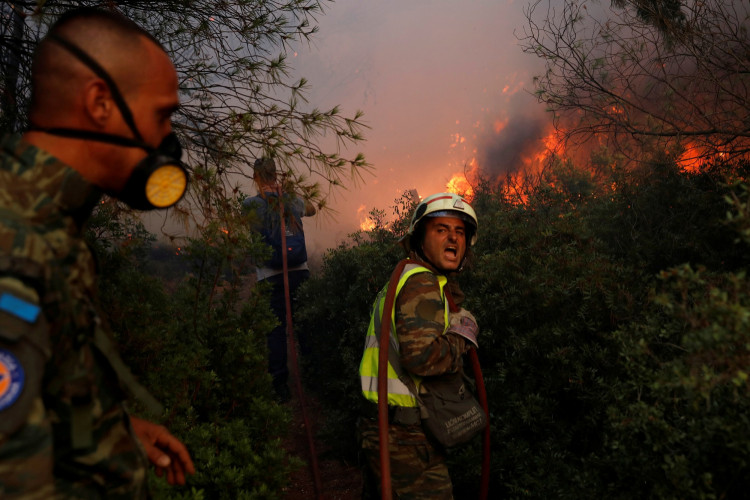Thousands of people were forced to flee their homes north of Athens after a forest fire spread to residential areas.
During a televised public briefing from the fire service's Crisis Management Center in the Halandri area, Greek Deputy Minister for Civil Protection Nikos Hardalias called the Varibobi wildfire "dangerous" and an "extreme weather phenomenon."
Hundreds of youngsters were rescued from a summer camp outside the Athens suburb of Varympompi, according to local media, while the motorway connecting the capital with the country's north and south was closed for safety concerns.
According to the Greek fire service, some 300 individuals had to be evacuated due to the approaching flames. Police said they assisted 70 people in fleeing residences at risk of fire.
Seven water-bombing aircraft, five helicopters, 70 fire trucks and over 500 firemen battled the flames in a zone that included the former Greek royal family's vacation house of Tatoi and many monasteries.
Temperatures in parts of Athens surpassed 42 degrees Celsius (107.6 degrees Fahrenheit) as the heatwave that has scorched the eastern Mediterranean intensified.
Extreme weather conditions have fueled catastrophic wildfires in Turkey, as well as fires in Albania and Italy.
Authorities reported wildfires were also raging in other parts of Greece, causing evacuations in a coastal region of the southern Peloponnese region, as well as on the islands of Evia and Kos.
During the midday hours, authorities closed ancient landmarks, including the Acropolis. The site, which is usually open from 8 a.m. to 8 p.m. throughout the summer, will be closed between midday and 5 p.m.
The fire destroyed electricity pylons, putting further strain on an electricity network already stressed by growing air conditioning use.
The Greek fire service issued an alert for the majority of the country on Tuesday and Wednesday, while public and private services changed their operating hours to accommodate for afternoon closures.
Greece is experiencing its worst heatwave in over 30 years. More than 1,000 people died as a result of the country's July 1987 heatwave.
The AFP news agency got a leaked draft of the newest UN report on climate change in July, ahead of a November conference in Glasgow, Scotland. It cautioned that the world may be approaching a point of no return in its efforts to mitigate the effects of global warming.






